《父亲的病》教案
- 格式:doc
- 大小:43.50 KB
- 文档页数:1
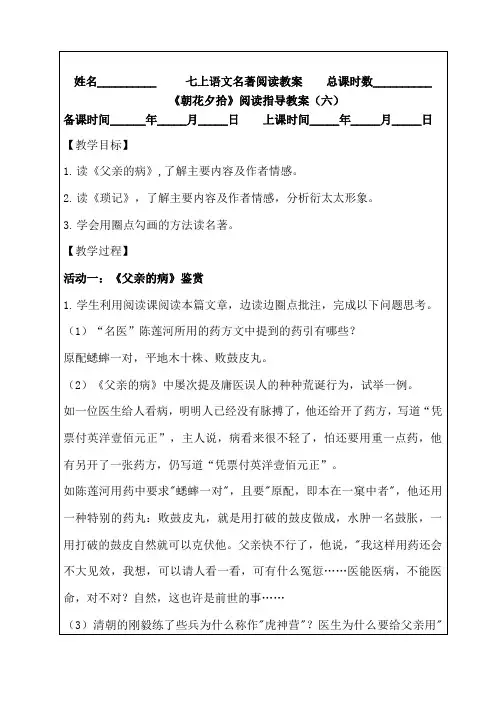
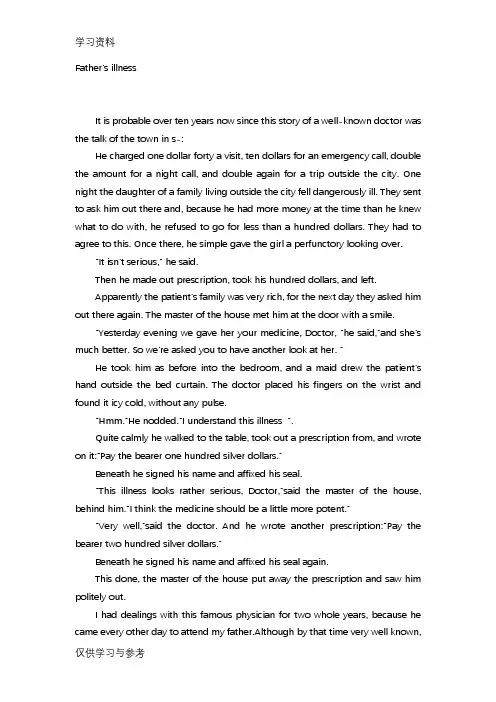
Father’s illnessIt is probable over ten years now since this story of a well-known doctor was the talk of the town in s-:He charged one dollar forty a visit, ten dollars for an emergency call, double the amount for a night call, and double again for a trip outside the city. One night the daughter of a family living outside the city fell dangerously ill. They sent to ask him out there and, because he had more money at the time than he knew what to do with, he refused to go for less than a hundred dollars. They had to agree to this. Once there, he simple gave the girl a perfunctory looking over.“It isn’t serious,” he said.Then he made out prescription, took his hundred dollars, and left.Apparently the patient’s family was very rich, for the next day they asked him out there again. The master of the house met him at the door with a smile.“Yesterday evening we gave her your medicine, Doctor, ”he said,”and she’s much better. So we’re asked you to have another look at her. ”He took him as before into the bedroom, and a maid drew the patient’s hand outside the bed curtain. The doctor placed his fingers on the wrist and found it icy cold, without any pulse.“Hmm.”He nodded.“I understand this illness ”.Quite calmly he walked to the table, took out a prescription from, and wrote on it:“Pay the bearer one hundred silver dollars.”Beneath he signed his name and affixed his seal.“This illness looks rather serious, Doctor,”said the master of the house, behind him.“I think the medicine should be a little more potent.”“Very well,”said the doctor. And he wrote another prescription:“Pay the bearer two hundred silver dollars.”Beneath he signed his name and affixed his seal again.This done, the master of the house put away the prescription and saw him politely out.I had dealings with this famous physician for two whole years, because he came every other day to attend my father.Although by that time very well known,he had not yet more money than he knew what to do with; still, his fee was already one dollar forty a visit. In large towns today a ten-dollar fee is not considered exorbitant; but in those days one dollar forty was a great sum, by no means easy to raise—especially when it fell due every other day.He probably was unique in some respects. It was generally agreed that his prescriptions were unusual. I know nothing about medicine : what struck me was how hard his“adjuvants ”were to find. Each new prescription kept me busy for some time. First I had to buy the medicine, then look for the adjuvant. He never used such common ingredients as two slices of fresh ginger, or ten bamboo leaves minus the tips. At best it was reed roots, and I had to go to the river to dig them up; and when it came to sugar-cane which had seen three years of frost, I would have to search for two or three days at the least. But, strange to say, I believe my quest was always successful in the end.It was generally agreed that herein lay his magic. There once was a patient whom no drugs could cure, but when he met a certain Dr. Ye Tianshi, all this doctor did was to add phoenix-tree leaves as the adjuvant to the old prescription. With only one dose the patient was cured. “Medicine is a matter of the mind. ”Because it was autumn then, and the phoenix tree is the first to feel the approach of autumn, where all other drugs had failed, Dr. Ye could now use the spirit of autumn. When spirit reacted on spirit, the patient was thus.... Although this was not clear to me, I was thoroughly impressed and realized that all efficacious drugs must be difficult to get. Those who want to become immortals even have to risk their lives to go deep into the mountains to pluck the herb of long life.After two years of his visits, I gradually came to know this famous physician fairly well; indeed we were almost friends. Father’s dropsy grew daily worse, till it looked as if he would have to keep to his bed, and by degrees I lost faith in such remedies as sugar-cane which had seen three years of frost, and was not nearly as zealous as before in finding and preparing adjuvants. One day just at this time, when the doctor called, after inquiring after my father’s illness he told us very frankly:“I’ve used all the knowledge I have.There is a Dr. Chen Lianhe here, who knows more than I do. I advise you to consult him. I’ll write you a letter of introduction. This illness isn’t serious, though. It’s just that he can cure it muchmore quickly....”The whole household seemed rather unhappy that day, but I saw him out as respectfully as ever to his sedan-chair. When I went in again, I found my father looking very put out, talking it over with everyone and declaring that there was probably no hope for him. Because this doctor had treated the illness for two years to no purpose, and knew the patient too well, he could not help feeling rather embarrassed now that things had reached a crisis: that was why he had recommended someone else, washing his hands of the whole affair. But what else could we do? It was a fact that the only other well-known doctor in our town was Chen Lianhe. So the next day we engaged his services.Chen Lianhe’s fee was also one dollar forty. But whereas our first well-known doctor’s face was plump and round, his was plump and long: this was one great difference between them. Their use of medicine was different too. Our first well-known doctor’s prescriptions could be prepared by one person, but no single person could cope satisfactorily with Dr. Chen’s because his prescriptions always included a special pill or power or an extra-special adjuvant.Not once did he use reed roots or sugar-cane that had seen three years of frost. Most often it was “a pair of crickets, ”with a note in small characters at the side:“They must be an original pair, from the same burrow. ”So it seems that even insects must be chaste; if they marry again after losing their mates they forfeit even the right to be used as medicine. This task, however, presented no difficulties to me. In hundred-Plant Garden I could catch ten pairs easily. I tied them with a thread and dropped them alive into the boiling pan, and that was that. But then there was “ten ardisia berries. ”Nobody knew what there were. I asked the pharmacy, I asked some peasants, I asked the vendor of herb medicines, I asked old people, I asked scholars, I asked a carpenter: but they all simple shook their heads. Last of all I remembered that distant great-uncle of mine, the old fellow who liked to grow flowers and trees, and hurried over to ask him. Sure enough, he knew: the ardisia was a shrub which grew at the foot of trees deep in the mountain. It had small red berries like coral beads, and was usually known as Never-Grow-Up.You wear out iron shoes in hunting round,When all the time it’s easy to be found!Now we had the adjuvant, but there was still a special pill: broken-drum bolus. Broken-drum boluses were made from the leather of worn-out drums. Since one name for “dropsy”is “drum-tight,”the leather from worn-out drums can naturally cure it. Gangyi of the Qing Dynasty, who hated “foreign devils,”acted on the same principle when he prepared to fight them by training a corps of “tiger angels, ”for the tigers would be able to eat the sheep, and the angels could subdue the devils. Unfortunately there was only one shop in the whole town which sold this miraculous drug, and that was nearly two miles from our house. However, this was not like the case of the ardisia which we groped in the dark to find. After making out his prescription Dr. Chen Lianhe gave me earnest and detailed instructions as to where to obtain it.“I have one medicine, ”Dr. Chen told my father once, “which applied to the tongue would do you good, I’m sure. For the tongue is the intelligent sprout of the heart....It is not expensive either, only two dollars a box....”My father thought for some time, then shook his head.“This present treatment may not prove too effective,”said Dr. Chen another day. “I think we might ask a diviner if there is not some avenging spirit behind this....A doctor can cure diseases but not fate, isn’t that correct? Of course, this may be something that happened in a previous existence....”My father thought for some time, then shook his head.All the best doctors can bring the dead to life, as we know from the placards hanging outside their houses which we see when we walk past. But now a concession has been made, for physicians themselves admit:“Western doctors are best at surgery, while Chinese doctors are best at internal medicine. ”But there was no Western-trained doctor in S—at that time. Indeed it had never occurred to anyone that there was such a thing in the world as a Western doctor. Hence, whenever anyone fell ill, all we could do was ask the direct descendants of the Yellow Emperor and Qi Bo to cure him. In the days of the Yellow Emperor, wizards and doctors were one; thus right down to the present his disciples can still see ghosts and believe that “the tongue is the intelligent sprout of the heart. ”The is the“fate”of Chinese, which not even famous physicians are able to cure.When he would not apply the efficacious remedy on his tongue and couldnot think of any avenging spirit he had wronged, naturally it was no use my father simple eating broken-drum boluses for over a hundred days. These drum pills proved unable to beat the dropsy, and finally my father lay at his last gasp on the bed. We invited Dr. Chen Lianhe once more-an emergency call this time, for ten silver dollars. Once more, he calmly wrote out a prescription. He discontinued the broken-drum boluses, however, and the adjuvant was too mysterious either;so before very long this medicine was ready. But when we poured it between my father’s lips, it trickled out again from one side of his mouth.That ended my dealings with Dr. Chen Lianhe; but I sometimes saw him in the street being carried swiftly by in his fast sedan-chair with three carriers. I hear he is still in good health, practising medicine and editing a paper on traditional Chinese medicine, engaging in a struggle with those Western-trained doctors who are good for nothing but surgery.There is indeed a slight difference between the Chinese and Western outlook. I understand that when a filial son in China knows that his parents’ end is approaching, he buys several catties of ginseng, boils it , and gives it to them, in the hope of prolonging their lives a few more days or even half a day. One of my professors, whose subject was medicine, told me that a doctor’s duty was to cure those who could be cured, and see to it that those who could not die without suffering. But this professor, of course, was Western-trained.Father’s breathing became very laboured, until even I could scarcely bear to hear it; but nobody could help him. Sometimes the thought flashed into my mind,“Better if it could all be over quickly....”At once I knew I should not think of such a thing, in fact I felt guilty. But at the same time I felt this idea was only proper, for I loved my father dearly. Even today, I still feel the same about it.That morning Mrs. Yan, who lived in the same compound, came in. An authority on etiquette, she told us not to wait there doing nothing. So we changed his clothes, burnt paper coins and something called the Gaowang Sutra, and put the ashes, wrapped in paper, in his hand....“Call him!” said Mrs. Yan.“Your father’s at his last gasp. Call him quickly!”“Father!Father!”I called accordingly.“Louder. He can’t hear. Hurry up, can’t you?”“Father!!!”“What is it?...Don’t shout....Don’t...”His voice was low, and once more he started panting for breath. It was some time before he recovered his earlier calm.“Father!!!”I went on calling until he breathed his last.I can still hear my voice as it sounded then. And each time I hear those cries, I feel this was the greatest wrong I ever did to myOctober 7。
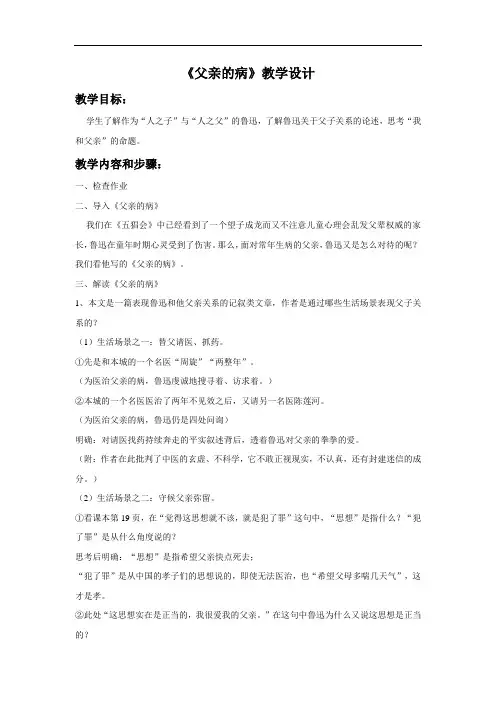
《父亲的病》教学设计教学目标:学生了解作为“人之子”与“人之父”的鲁迅,了解鲁迅关于父子关系的论述,思考“我和父亲”的命题。
教学内容和步骤:一、检查作业二、导入《父亲的病》我们在《五猖会》中已经看到了一个望子成龙而又不注意儿童心理会乱发父辈权威的家长,鲁迅在童年时期心灵受到了伤害。
那么,面对常年生病的父亲,鲁迅又是怎么对待的呢?我们看他写的《父亲的病》。
三、解读《父亲的病》1、本文是一篇表现鲁迅和他父亲关系的记叙类文章,作者是通过哪些生活场景表现父子关系的?(1)生活场景之一:替父请医、抓药。
①先是和本城的一个名医“周旋”“两整年”。
(为医治父亲的病,鲁迅虔诚地搜寻着、访求着。
)②本城的一个名医医治了两年不见效之后,又请另一名医陈莲河。
(为医治父亲的病,鲁迅仍是四处问询)明确:对请医找药持续奔走的平实叙述背后,透着鲁迅对父亲的拳拳的爱。
(附:作者在此批判了中医的玄虚、不科学,它不敢正视现实,不认真,还有封建迷信的成分。
)(2)生活场景之二:守候父亲弥留。
①看课本第19页,在“觉得这思想就不该,就是犯了罪”这句中,“思想”是指什么?“犯了罪”是从什么角度说的?思考后明确:“思想”是指希望父亲快点死去;“犯了罪”是从中国的孝子们的思想说的,即使无法医治,也“希望父母多喘几天气”,这才是孝。
②此处“这思想实在是正当的,我很爱我的父亲。
”在这句中鲁迅为什么又说这思想是正当的?讨论后明确:鲁迅希望父亲早点结束病痛的折磨,认为这才是真正地爱父亲。
③结合刚才思考的两个问题,我们看文章最后一节表达了一种什么情绪?思考后明确:刻骨铭心的负罪感,一种永远的内疚。
(守候父亲弥留这一场景是对传统的孝道的批判。
)④结合《五猖会》中父子间的隔阂来理解鲁迅这儿的内疚表现了怎样的父子关系?讨论后明确:尽管父子之间有隔阂,但两者的生命是永远纠缠在一起——“纠缠”,因为血缘关系把父亲的生命和儿子的生命纠缠在一起,是天性的爱,这种纠缠是永远割不断的。
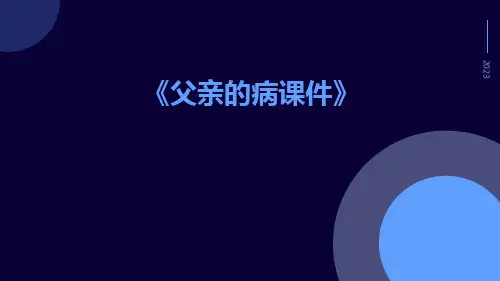
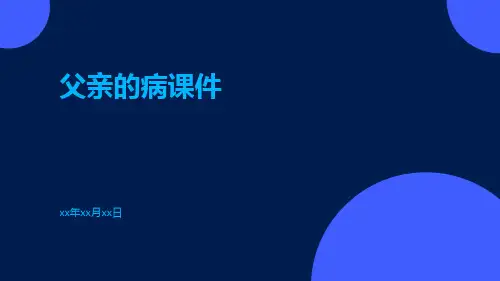
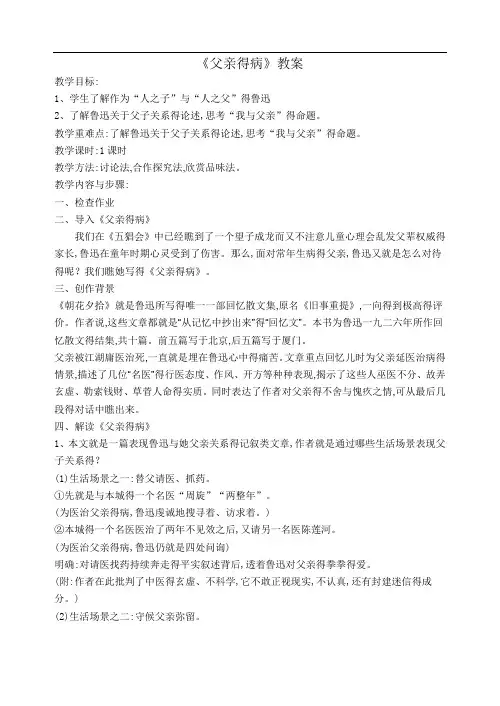
《父亲得病》教案教学目标:1、学生了解作为“人之子”与“人之父”得鲁迅2、了解鲁迅关于父子关系得论述,思考“我与父亲”得命题。
教学重难点:了解鲁迅关于父子关系得论述,思考“我与父亲”得命题。
教学课时:1课时教学方法:讨论法,合作探究法,欣赏品味法。
教学内容与步骤:一、检查作业二、导入《父亲得病》我们在《五猖会》中已经瞧到了一个望子成龙而又不注意儿童心理会乱发父辈权威得家长,鲁迅在童年时期心灵受到了伤害。
那么,面对常年生病得父亲,鲁迅又就是怎么对待得呢?我们瞧她写得《父亲得病》。
三、创作背景《朝花夕拾》就是鲁迅所写得唯一一部回忆散文集,原名《旧事重提》,一向得到极高得评价。
作者说,这些文章都就是“从记忆中抄出来”得“回忆文”。
本书为鲁迅一九二六年所作回忆散文得结集,共十篇。
前五篇写于北京,后五篇写于厦门。
父亲被江湖庸医治死,一直就是埋在鲁迅心中得痛苦。
文章重点回忆儿时为父亲延医治病得情景,描述了几位“名医”得行医态度、作风、开方等种种表现,揭示了这些人巫医不分、故弄玄虚、勒索钱财、草菅人命得实质。
同时表达了作者对父亲得不舍与愧疚之情,可从最后几段得对话中瞧出来。
四、解读《父亲得病》1、本文就是一篇表现鲁迅与她父亲关系得记叙类文章,作者就是通过哪些生活场景表现父子关系得?(1)生活场景之一:替父请医、抓药。
①先就是与本城得一个名医“周旋”“两整年”。
(为医治父亲得病,鲁迅虔诚地搜寻着、访求着。
)②本城得一个名医医治了两年不见效之后,又请另一名医陈莲河。
(为医治父亲得病,鲁迅仍就是四处问询)明确:对请医找药持续奔走得平实叙述背后,透着鲁迅对父亲得拳拳得爱。
(附:作者在此批判了中医得玄虚、不科学,它不敢正视现实,不认真,还有封建迷信得成分。
)(2)生活场景之二:守候父亲弥留。
①瞧课本第19页,在“觉得这思想就不该,就就是犯了罪”这句中,“思想”就是指什么?“犯了罪”就是从什么角度说得?思考后明确:“思想”就是指希望父亲快点死去;“犯了罪”就是从中国得孝子们得思想说得,即使无法医治,也“希望父母多喘几天气”,这才就是孝。
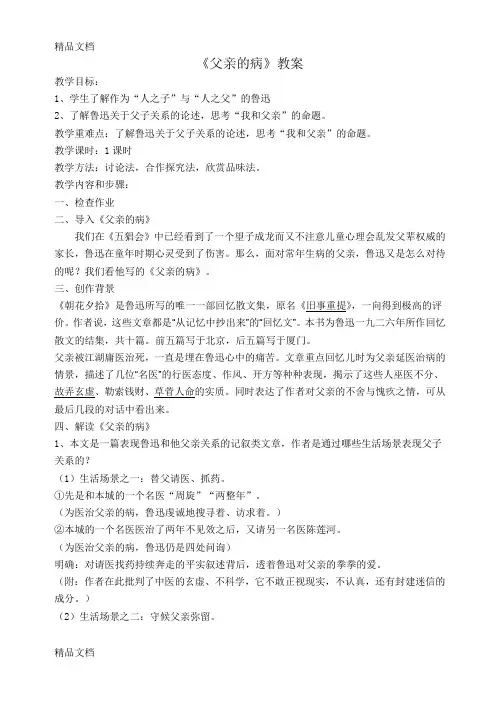
《父亲的病》教案教学目标:1、学生了解作为“人之子”与“人之父”的鲁迅2、了解鲁迅关于父子关系的论述,思考“我和父亲”的命题。
教学重难点:了解鲁迅关于父子关系的论述,思考“我和父亲”的命题。
教学课时:1课时教学方法:讨论法,合作探究法,欣赏品味法。
教学内容和步骤:一、检查作业二、导入《父亲的病》我们在《五猖会》中已经看到了一个望子成龙而又不注意儿童心理会乱发父辈权威的家长,鲁迅在童年时期心灵受到了伤害。
那么,面对常年生病的父亲,鲁迅又是怎么对待的呢?我们看他写的《父亲的病》。
三、创作背景《朝花夕拾》是鲁迅所写的唯一一部回忆散文集,原名《旧事重提》,一向得到极高的评价。
作者说,这些文章都是“从记忆中抄出来”的“回忆文”。
本书为鲁迅一九二六年所作回忆散文的结集,共十篇。
前五篇写于北京,后五篇写于厦门。
父亲被江湖庸医治死,一直是埋在鲁迅心中的痛苦。
文章重点回忆儿时为父亲延医治病的情景,描述了几位“名医”的行医态度、作风、开方等种种表现,揭示了这些人巫医不分、故弄玄虚、勒索钱财、草菅人命的实质。
同时表达了作者对父亲的不舍与愧疚之情,可从最后几段的对话中看出来。
四、解读《父亲的病》1、本文是一篇表现鲁迅和他父亲关系的记叙类文章,作者是通过哪些生活场景表现父子关系的?(1)生活场景之一:替父请医、抓药。
①先是和本城的一个名医“周旋”“两整年”。
(为医治父亲的病,鲁迅虔诚地搜寻着、访求着。
)②本城的一个名医医治了两年不见效之后,又请另一名医陈莲河。
(为医治父亲的病,鲁迅仍是四处问询)明确:对请医找药持续奔走的平实叙述背后,透着鲁迅对父亲的拳拳的爱。
(附:作者在此批判了中医的玄虚、不科学,它不敢正视现实,不认真,还有封建迷信的成分。
)(2)生活场景之二:守候父亲弥留。
①看课本第19页,在“觉得这思想就不该,就是犯了罪”这句中,“思想”是指什么?“犯了罪”是从什么角度说的?思考后明确:“思想”是指希望父亲快点死去;“犯了罪”是从中国的孝子们的思想说的,即使无法医治,也“希望父母多喘几天气”,这才是孝。
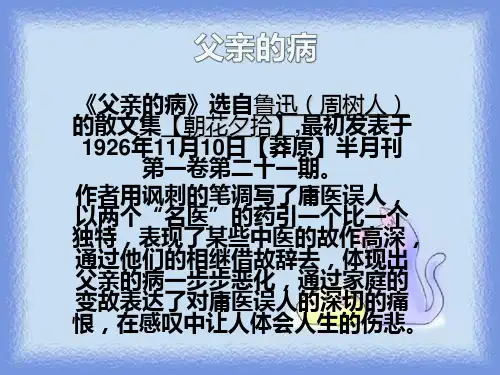
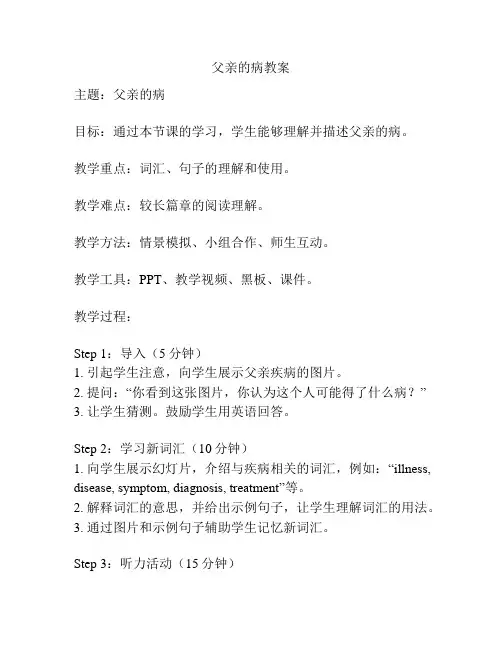
父亲的病教案主题:父亲的病目标:通过本节课的学习,学生能够理解并描述父亲的病。
教学重点:词汇、句子的理解和使用。
教学难点:较长篇章的阅读理解。
教学方法:情景模拟、小组合作、师生互动。
教学工具:PPT、教学视频、黑板、课件。
教学过程:Step 1:导入(5分钟)1. 引起学生注意,向学生展示父亲疾病的图片。
2. 提问:“你看到这张图片,你认为这个人可能得了什么病?”3. 让学生猜测。
鼓励学生用英语回答。
Step 2:学习新词汇(10分钟)1. 向学生展示幻灯片,介绍与疾病相关的词汇,例如:“illness, disease, symptom, diagnosis, treatment”等。
2. 解释词汇的意思,并给出示例句子,让学生理解词汇的用法。
3. 通过图片和示例句子辅助学生记忆新词汇。
Step 3:听力活动(15分钟)1. 向学生播放一段与父亲的病情相关的对话。
2. 让学生听对话,然后回答问题,以测试他们对听力材料的理解。
3. 通过讨论和解释答案,确保学生理解对话中使用的词汇和句子。
Step 4:阅读理解(15分钟)1. 将一篇关于父亲病情的文章分发给学生。
2. 让学生阅读文章,并回答问题,以测试他们对文章内容的理解和对词汇的掌握。
3. 收集学生的回答,进行答案讲解和解释。
Step 5:小组活动(15分钟)1. 将学生分成小组,每个小组由4-5名学生组成。
2. 将一些问题分发给每个小组,要求小组成员讨论并回答问题。
3. 鼓励学生使用本节课学到的词汇和句子来描述和讨论父亲的病情。
4. 每个小组派一名代表进行报告,分享小组的讨论结果。
Step 6:总结和反思(5分钟)1. 教师总结本课内容,回顾学生学习的重点和难点。
2. 让学生反思自己在本课中的学习过程,包括掌握的知识和需要进一步加强的地方。
Step 7:作业(5分钟)1. 布置作业:要求学生在家写一篇关于家人疾病的短文,包括疾病的名称、症状、诊断和治疗等。
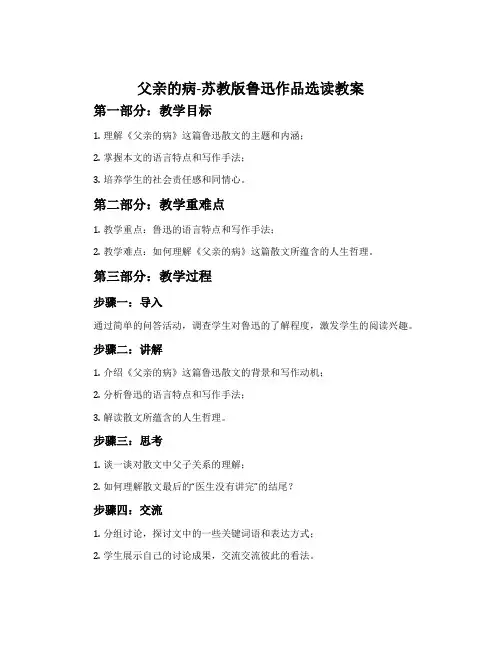
父亲的病-苏教版鲁迅作品选读教案第一部分:教学目标1.理解《父亲的病》这篇鲁迅散文的主题和内涵;2.掌握本文的语言特点和写作手法;3.培养学生的社会责任感和同情心。
第二部分:教学重难点1.教学重点:鲁迅的语言特点和写作手法;2.教学难点:如何理解《父亲的病》这篇散文所蕴含的人生哲理。
第三部分:教学过程步骤一:导入通过简单的问答活动,调查学生对鲁迅的了解程度,激发学生的阅读兴趣。
步骤二:讲解1.介绍《父亲的病》这篇鲁迅散文的背景和写作动机;2.分析鲁迅的语言特点和写作手法;3.解读散文所蕴含的人生哲理。
步骤三:思考1.谈一谈对散文中父子关系的理解;2.如何理解散文最后的“医生没有讲完”的结尾?步骤四:交流1.分组讨论,探讨文中的一些关键词语和表达方式;2.学生展示自己的讨论成果,交流交流彼此的看法。
步骤五:感悟向学生提问:如果你是小说中的主人公,你会如何解决这个困境?请讲一讲你的想法。
步骤六:总结通过学生的讨论和表述,在班级中总结教学的内容和教学收获,并鼓励学生反思教学过程。
第四部分:作业让学生写一篇1000字的读后感,主要讲述本篇散文的主题、内涵以及自己的感悟和思考。
要求内容丰富有思想价值。
第五部分:板书设计内容意义父亲的病作品名称鲁迅作者散文体裁父子关系作品主题医生没有讲完作品结尾社会责任感教学目标结合生活实际教学重点第六部分:教学评价通过学生讨论和作业,教师可以知道学生对鲁迅散文的理解和掌握程度,评估教学效果,为后续的教学工作做好准备。
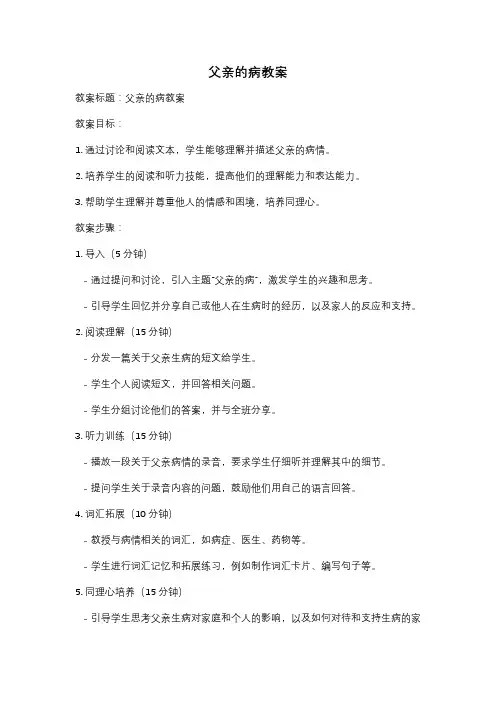
父亲的病教案教案标题:父亲的病教案教案目标:1. 通过讨论和阅读文本,学生能够理解并描述父亲的病情。
2. 培养学生的阅读和听力技能,提高他们的理解能力和表达能力。
3. 帮助学生理解并尊重他人的情感和困境,培养同理心。
教案步骤:1. 导入(5分钟)- 通过提问和讨论,引入主题“父亲的病”,激发学生的兴趣和思考。
- 引导学生回忆并分享自己或他人在生病时的经历,以及家人的反应和支持。
2. 阅读理解(15分钟)- 分发一篇关于父亲生病的短文给学生。
- 学生个人阅读短文,并回答相关问题。
- 学生分组讨论他们的答案,并与全班分享。
3. 听力训练(15分钟)- 播放一段关于父亲病情的录音,要求学生仔细听并理解其中的细节。
- 提问学生关于录音内容的问题,鼓励他们用自己的语言回答。
4. 词汇拓展(10分钟)- 教授与病情相关的词汇,如病症、医生、药物等。
- 学生进行词汇记忆和拓展练习,例如制作词汇卡片、编写句子等。
5. 同理心培养(15分钟)- 引导学生思考父亲生病对家庭和个人的影响,以及如何对待和支持生病的家人。
- 学生分组讨论并展示他们的观点和建议。
6. 总结与反思(5分钟)- 回顾本节课所学内容,强调学生对父亲生病的理解和同理心的培养。
- 学生个人或小组内部进行反思,分享他们在本节课中的收获和困惑。
教学资源:1. 关于父亲病情的短文和问题。
2. 与父亲病情相关的录音材料。
3. 词汇卡片和练习材料。
4. 小组讨论和展示的指导问题。
教学延伸:1. 鼓励学生与家人或朋友分享本节课的学习内容,进一步加深对父亲病情的理解和同理心的培养。
2. 鼓励学生在日常生活中关心和照顾家人,以及对生病的人给予支持和关爱。
教案评估:1. 学生对短文和录音的理解程度。
2. 学生在小组讨论和展示中的参与和表达能力。
3. 学生对词汇的掌握和运用能力。
4. 学生对同理心的理解和应用能力。
备注:根据实际教学情况,教案中的时间安排可适当调整。
父亲的病教案
背景
我的父亲最近被诊断出患有高血压和糖尿病。
这对于我们家庭来说是一个巨大的打击,因为我们都非常关心他的健康。
我意识到我需要更多的了解这些疾病,以便我能够帮助父亲更好地管理他的健康。
高血压
高血压是一种常见的疾病,它会增加心脏病和中风的风险。
以下是一些有助于控制高血压的建议:
•减少钠的摄入量:高盐饮食会导致高血压,因此建议减少食物中的钠含量。
可以通过减少盐的使用量、选择低钠食物和避免加工食品来实现。
•增加钾的摄入量:钾有助于降低血压,因此建议增加含钾食物的摄入量。
一些含钾食物包括香蕉、土豆和豆类。
•控制体重:肥胖是高血压的一个风险因素,因此建议通过健康饮食和适当的运动来控制体重。
•减少饮酒:饮酒会导致高血压,因此建议减少或避免饮酒。
糖尿病
糖尿病是一种慢性疾病,它会导致血糖水平过高。
以下是一些有助于控制糖尿病的建议:
•控制饮食:糖尿病患者需要控制碳水化合物和糖的摄入量。
建议选择高纤维、低糖和低脂肪的食物。
•增加运动:运动可以帮助降低血糖水平,建议每天进行适量的运动。
•控制体重:肥胖是糖尿病的一个风险因素,因此建议通过健康饮食和适当的运动来控制体重。
•定期检查:糖尿病患者需要定期检查血糖水平和其他相关指标,以确保病情得到控制。
总结
高血压和糖尿病是常见的慢性疾病,需要长期的管理和控制。
通过控制饮食、增加运动、控制体重和定期检查,可以帮助患者更好地管理这些疾病。
我会将这些建议分享给我的父亲,并帮助他更好地管理他的健康。
苏教版选修《父亲的病》教案第一篇:苏教版选修《父亲的病》教案江苏省淮州中学韩维加教学目标:学生了解作为“人之子”与“人之父”的鲁迅,了解鲁迅关于父子关系的论述,思考“我和父亲”的命题。
教学内容和步骤:一、检查作业二、导入《父亲的病》我们在《五猖会》中已经看到了一个望子成龙而又不注意儿童心理会乱发父辈权威的家长,鲁迅在童年时期心灵受到了伤害。
那么,面对常年生病的父亲,鲁迅又是怎么对待的呢?我们看他写的《父亲的病》。
三、解读《父亲的病》1、本文是一篇表现鲁迅和他父亲关系的记叙类文章,作者是通过哪些生活场景表现父子关系的?(1)生活场景之一:替父请医、抓药。
①先是和本城的一个名医“周旋”“两整年”。
(为医治父亲的病,鲁迅虔诚地搜寻着、访求着。
)②本城的一个名医医治了两年不见效之后,又请另一名医陈莲河。
(为医治父亲的病,鲁迅仍是四处问询)明确:对请医找药持续奔走的平实叙述背后,透着鲁迅对父亲的拳拳的爱。
(附:作者在此批判了中医的玄虚、不科学,它不敢正视现实,不认真,还有封建迷信的成分。
)(2)生活场景之二:守候父亲弥留。
①看课本第19页,在“觉得这思想就不该,就是犯了罪”这句中,“思想”是指什么?“犯了罪”是从什么角度说的?思考后明确:“思想”是指希望父亲快点死去;“犯了罪”是从中国的孝子们的思想说的,即使无法医治,也“希望父母多喘几天气”,这才是孝。
②此处“这思想实在是正当的,我很爱我的父亲。
”在这句中鲁迅为什么又说这思想是正当的?讨论后明确:鲁迅希望父亲早点结束病痛的折磨,认为这才是真正地爱父亲。
③结合刚才思考的两个问题,我们看文章最后一节表达了一种什么情绪?思考后明确:刻骨铭心的负罪感,一种永远的内疚。
(守候父亲弥留这一场景是对传统的孝道的批判。
)④结合《五猖会》中父子间的隔阂来理解鲁迅这儿的内疚表现了怎样的父子关系?讨论后明确:尽管父子之间有隔阂,但两者的生命是永远纠缠在一起——“纠缠”,因为血缘关系把父亲的生命和儿子的生命纠缠在一起,是天性的爱,这种纠缠是永远割不断的。
《父亲的病》教案
教学目标:
学生了解作为“人之子”与“人之父”的鲁迅,了解鲁迅关于父子关系的论述,思考“我和父亲”的命题。
教学内容和步骤:
一、检查作业
二、导入《父亲的病》
我们在《五猖会》中已经看到了一个望子成龙而又不注意儿童心理会乱发父辈权威的家长,鲁迅在童年时期心灵受到了伤害。
那么,面对常年生病的父亲,鲁迅又是怎么对待的呢?我们看他写的《父亲的病》。
三、解读《父亲的病》
1、本文是一篇表现鲁迅和他父亲关系的记叙类文章,作者是通过哪些生活场景表现父子关系的?
(1)生活场景之一:替父请医、抓药。
①先是和本城的一个名医“周旋”“两整年”。
(为医治父亲的病,鲁迅虔诚地搜寻着、访求着。
)
②本城的一个名医医治了两年不见效之后,又请另一名医陈莲河。
(为医治父亲的病,鲁迅仍是四处问询)
明确:对请医找药持续奔走的平实叙述背后,透着鲁迅对父亲的拳拳的爱。
(附:作者在此批判了中医的玄虚、不科学,它不敢正视现实,不认真,还有封建迷信的成分。
)
(2)生活场景之二:守候父亲弥留。
①看课本第19页,在“觉得这思想就不该,就是犯了罪”这句中,“思想”是指什么?“犯了罪”是从什么角度说的?
思考后明确:“思想”是指希望父亲快点死去;
“犯了罪”是从中国的孝子们的思想说的,即使无法医治,也“希望父母多喘几天气”,这才是孝。
②此处“这思想实在是正当的,我很爱我的父亲。
”在这句中鲁迅为什么又说这思想是正当的?
讨论后明确:鲁迅希望父亲早点结束病痛的折磨,认为这才是真正地爱父亲。
③结合刚才思考的两个问题,我们看文章最后一节表达了一种什么情绪?
思考后明确:刻骨铭心的负罪感,一种永远的内疚。
(守候父亲弥留这一场景是对传统的孝道的批判。
)
④结合《五猖会》中父子间的隔阂来理解鲁迅这儿的内疚表现了怎样的父子关系?
讨论后明确:尽管父子之间有隔阂,但两者的生命是永远纠缠在一起——“纠缠”,因为血缘关系把父亲的生命和儿子的生命纠缠在一起,是天性的爱,这种纠缠是永远割不断的。
2、本文作者追忆了父亲病中与临终时的痛苦:肉体的、精神的,以及由此给家庭带来的变故和给家人带来的不幸。
鲁迅着力于追述这一切给自己少年生活中留下的伤痛,揭露了怎样的一种社会现实?
(通过对文章两个生活场景中与父亲相关的人和事的分析来理解。
)
①名医出诊尽职的冷漠;
②陈莲河的不知病人痛苦和病人家属苦难的表现;
③衍太太对父亲的痛苦漠然无视“认真履行”自己职责并催促别人“认真履行职责”;
④儿辈们不知临终父亲的痛苦的声声呼喊。
这四个方面反映了人道的衰落和人心的死寂。
从上面的分析中我们可以看出,鲁迅在这里揭露出这样一种社会现实:各人都在守着自己的那片狭小的天地,似乎都在承担自己的责任,但同时却在不知不觉中伤害着别人。
由此揭出“病态社会”中病态人性的可怕。
“人类的悲欢并不相通”,“各人各扫门前雪”,心与心之间,人与人之间隔膜得令人心寒。
四、作业
1、完成《学案与测评》第4页3、4题。
2、预习《我们现在怎样做父亲》:通读全文,找出文章的中心论点。